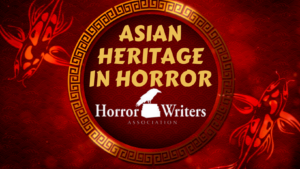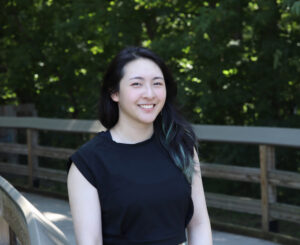Asian Heritage in Horror Month: An Introduction by Ai Jiang

What does it mean to be API/AANHPI?
I suppose I will take a more personal approach to this question, as it is definitely one that has persistently popped up throughout my life. For me, it has always been: what does it mean to be Asian, or more specifically in my case, Chinese? As a child, I was born and spent the early years of my life in China, and even after arriving in Canada, I experienced a more traditional Chinese upbringing at home while undergoing Westernized studies, settings, and culture while in school. I can read and write in pinyin for the most part and can speak and understand Mandarin. I understand but speak very little Fuzhounese, and my ability to recognize Chinese characters is poor.
However, when compared to my sister, who was born in Canada, I notice a difference—one not just generational as she is five years younger. I am familiar with Chinese pop culture and media, but only of the past and not so much of the present, and because I had never undergone more than two years of schooling in China, my understanding of its historical as well as political and social past is lacking. Yet, instilled deep within me are the traditions and understanding of values and beliefs of my hometown, but not quite their ancient roots.
More often than not, newer immigrants would say I’m very Canadian while Canadians might say I’m very Chinese. And so, what am I exactly?
When I think about horror, particularly API/AANHPI heritage in horror, I think about the horror of being other, of not belonging, but sometimes also of belonging and of not wanting to belong—of assimilation and the lack of, of both its rejection and acceptance, of the wealth of history and culture we often leave before and at the same time clutch so tight onto. API/AANHPI Heritage in horror reminds me of the deeply rooted fears sometimes drawn from our ethnicity, its history, traditions, legends, myths, and folklore; sometimes it is the fear of our otherness; sometimes it is the fear of our lacking otherness; and sometimes it is all the above and far, far beyond.
But at times like this, I am also reminded of the uncles and aunties who never fail to remind me whenever I visit my hometown, no matter how long it has been, be it months, years, a decade—“Remember where you came from and who you are.” And I hold onto these words almost as reassurance that I am in fact Chinese, and I am in fact enough.
To me, API/AANHPI Heritage Month serves as both a reminder and celebration of who I am rather than who I am not. And I hope this month and this series do the same for all those reading this now.
 Ai Jiang is a Chinese-Canadian writer, Ignyte Award winner, Hugo, Astounding, Nebula, Locus, Bram Stoker, Aurora, and BFSA Award finalist, and an immigrant from Fujian currently residing in Ontario, Canada. Her work can be found in F&SF, The Dark, The Masters Review, among others. She is the recipient of Odyssey Workshop’s 2022 Fresh Voices Scholarship and the author of Linghun and I AM AI. The first book of her novella duology, A Palace Near the Wind, is forthcoming in 2025 from Titan Books. Find her on X (@AiJiang_), Instagram (@ai.jian.g), and online.
Ai Jiang is a Chinese-Canadian writer, Ignyte Award winner, Hugo, Astounding, Nebula, Locus, Bram Stoker, Aurora, and BFSA Award finalist, and an immigrant from Fujian currently residing in Ontario, Canada. Her work can be found in F&SF, The Dark, The Masters Review, among others. She is the recipient of Odyssey Workshop’s 2022 Fresh Voices Scholarship and the author of Linghun and I AM AI. The first book of her novella duology, A Palace Near the Wind, is forthcoming in 2025 from Titan Books. Find her on X (@AiJiang_), Instagram (@ai.jian.g), and online.



